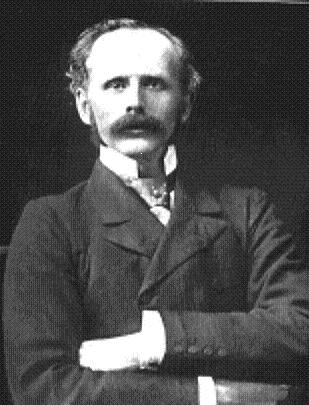
In part 1, I was discussing The Last Word of Great Scientists on Evolution, a 1925 antievolution pamphlet by J. J. Sims about which I have long been curious. The title is ambiguous: are the last words on evolution the final, conclusive, and binding verdict on evolution from the assembled host of great scientists, or their rattling deathbed croaks? Both, as it happens: Sims not only deploys the usual motley assemblage of putatively authoritative quotations but also relates not one but two deathbed recantations. The first, unsurprisingly, is Lady Hope’s story about Darwin. The second, which was unfamiliar to me, was a story about Henry Drummond (right; 1851–1897), the Scottish naturalist and Free Churchman whose The Ascent of Man (1894) was among the early influential versions of theistic evolutionism.
Drummond was taken seriously enough as a commentator that he was frequently cited in the Scopes era as a religious authority who accepted evolution—by, for example, Henshaw Ward in his Evolution for John Doe (1925), along with Charles Kingsley (1819–1875), a clergyman and novelist who corresponded with Darwin, and Harry Emerson Fosdick (1878–1969), a Baptist minister heavily involved in the fundamentalist/modernist controversy in the 1920s. Additionally, there is reason to suspect that Clarence Darrow’s influence didn’t stop with the Scopes era. In Inherit the Wind, the 1955 play by Jerome Lawrence and Robert E. Lee loosely based on the Scopes trial, the Clarence Darrow figure—whose attitude toward religion is substantially more irenic than his real-life counterpart’s—is named Henry Drummond. I doubt that this is a coincidence.
It would be convenient for evolution’s foes if a leading proponent of theistic evolutionism turned his back on his views. So that’s reason enough to suspect that the story of Drummond’s deathbed recantation is too good to be true. The only source for the claim seems to be Judson Eber Conant’s The Church: The Schools and Evolution (1922), which says of Drummond: “On his deathbed he said to Sir William Dawson, as reported in this country in the writer’s hearing by Dr. John Robertson directly from the lips of Dawson: ‘I am going away back to the Book to believe it and receive it as I did at the first. I can live no longer on uncertainties. I am going back to the faith of the Word of God.’” (The last two sentences are set as a block quote, but again I’m not going to bother to follow the typography here.)
How convincing is Conant’s report? Not especially. Besides the fact that this is a third-hand report, Drummond to Dawson to Robertson (too common a name for me to have any clue about its possessor) to Conant, it is apparently uncorroborated by anything in the standard sources of information about Drummond, such as George Adam Smith’s 1898 biography of Drummond (entitled, with a certain refreshing straightforwardness, The Life of Henry Drummond). Moreover, it’s awfully vague for a recantation of evolution; it’s not nearly as explicit as
Perhaps the primary source of the quote could provide some clarity? Well, it seems likely that Conant was referring to the Canadian scientist John William Dawson (1820–1899), who preferred not to use his first name, was knighted in 1884, and was a staunch opponent of evolution. According to his autobiographical Fifty Years of Work in
Conant refers to the Canadian Dawson as “Sir J. William Dawson” twice in his book, but in his discussion of Drummond’s deathbed recantation, he refers to “Sir William Dawson.” That might be just a minor inconsistency, but it’s also possible that “Sir William Dawson” was instead William James Dawson (1854–1928), a British Wesleyan-turned-Congregational minister (but not a knight) who, in a 1904 sermon “The Unavoidable Christ,” reproduced in The Evangelistic Note (1905), wrote of Drummond:
I knew him; I loved him; I honoured him; but I never honoured and wondered at Drummond so much as in the close of his life. Here was a man, in the pink of manly health and strength, suddenly touched with a mysterious finger, dying month by month, slowly, terribly, in torture. During all that crucifixion Henry Drummond went through he never lost his temper, never lost his cheerfulness.
On the basis of the evidence available, I can’t tell whether

